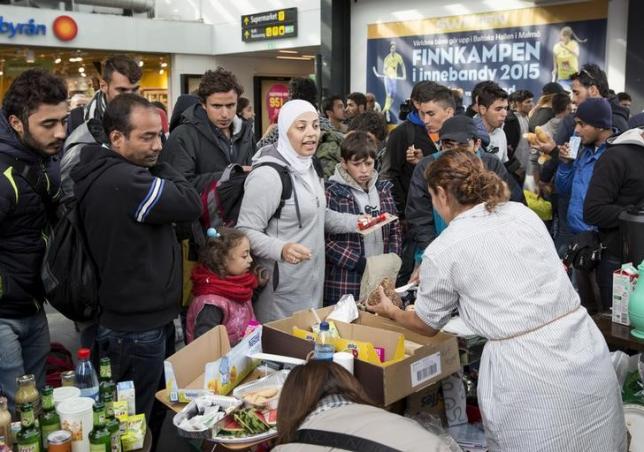Christian Post Report – Volunteers distribute food and drinks to migrants who arrived at Malmo train station in Sweden on the morning of September 10, 2015.
The Swedish government has said that as many as 80,000 migrants are set to have their asylum applications rejected and be deported out of the country, as Finland and Germany also announce tightened asylum policies in a bid to respond to to the ongoing refugee crisis.
Swedish interior minister Anders Ygeman said earlier this week that the 80,000 migrants would be taken out of the country via charter flights, but said the process could take several years. BBC News noted that as many as 163,000 migrants applied for asylum in Sweden in 2015, meaning that close to half of those have had their applications rejected.
Ygemen said that the number of migrants facing deportation right now is 60,000 people, but revealed that that “could climb to 80,000.”
Swedish migration minister Morgan Johansson admitted that there is no choice but to send the failed asylum seekers back to their countries of origin.
“Otherwise we would basically have free immigration and we can’t manage that,” he told news agency TT.
Other government officials, such as Mikael Ribbenvik, head of operations at the Swedish Migration Agency, said that such mass deportations will require more support in the form of resources.
“A lot of people leave voluntarily and a lot of people abscond. And then we have a few people that are staying on that are impossible to remove because of identification purposes,” Ribbenvik explained.
The Guardian reported on Thursday that Finland has also announced plans to deport around two thirds of the 32,000 asylum seekers that came to the country last year.
“In principle we speak of about two-thirds, meaning approximately 65 percent of the 32,000 will get a negative decision (on their asylum applications),” Paivi Nerg, administrative director of the interior ministry, told AFP News agency.
Germany, which in 2015 welcomed in close to 1.1 million people, more than any other country, has also announced that it will be toughening its asylum policies. Vice Chancellor Sigmar Gabriel said that migrants from countries like Algeria, Morocco and Tunisia would have little chance of winning asylum, while some migrants would also be blocked from bringing their families to Germany for two years.
Debate over the broad welcome of refugees has reached high levels in Germany, and protests from far-right groups such as PEGIDA have flared over sexual assaults on women in Cologne on New Year’s Eve, which some reports have linked to gangs of men from North African and Arab origin.
Stefani Weiss, director and expert on European politics at Bertelsmann Stiftung, an independent, nonprofit German foundation, told The Christian Post last week that Germany is indeed facing big challenges surrounding the refugee crisis, but said that now is not the time for hysterics.
“The important thing is not to become hysterical. As painful as the incident in Cologne is, this is not a picture of daily life and security in Germany,” Weiss told CP.
“There is deterioration, there are ghettos, but this is still something we could improve with more proactive means, with preventative means, with more police around, and with a better judicial system that really is able to take a hold on those criminals and place them before a judge,” she added, calling for a European solution to the issue.
Source : Christian Post
